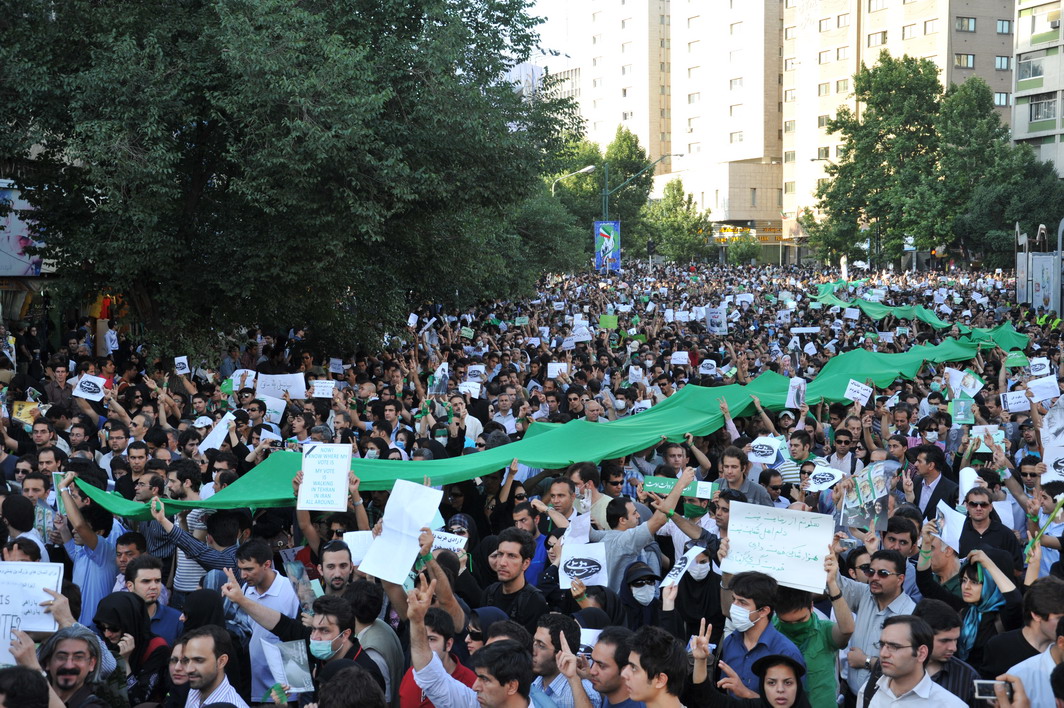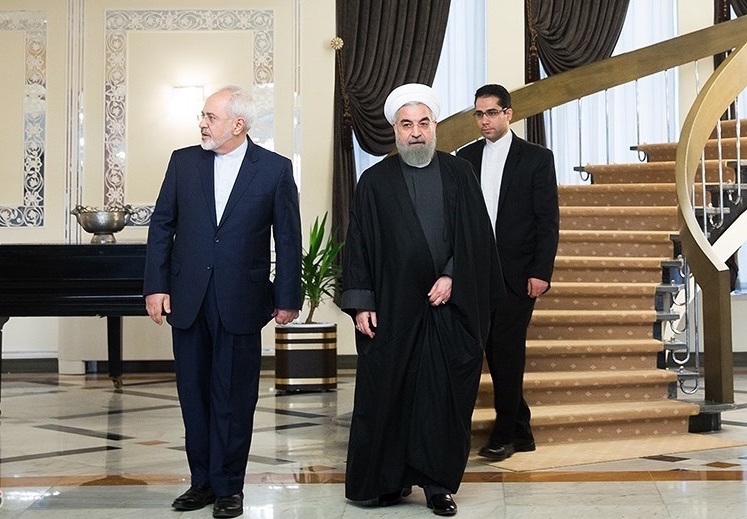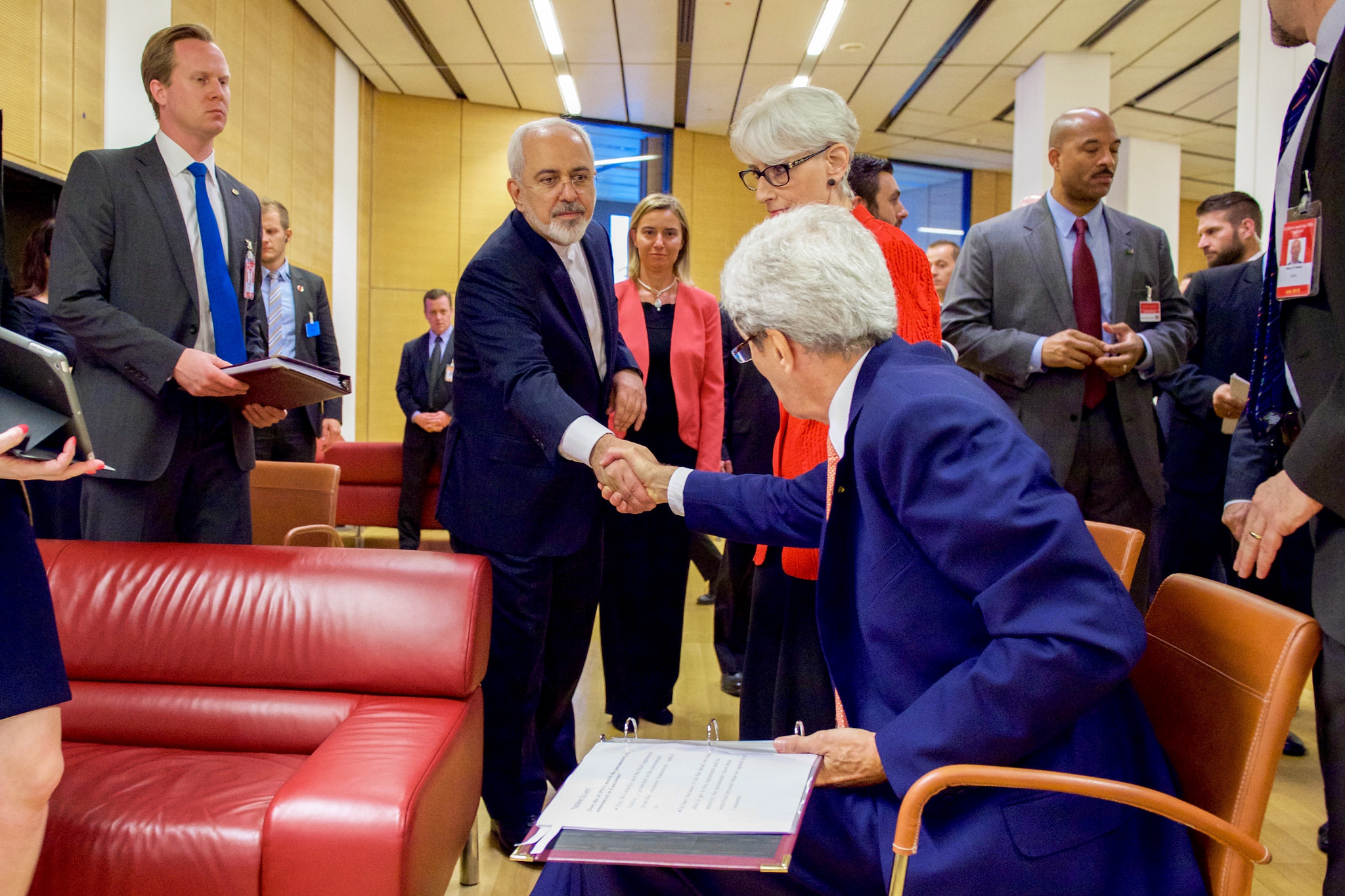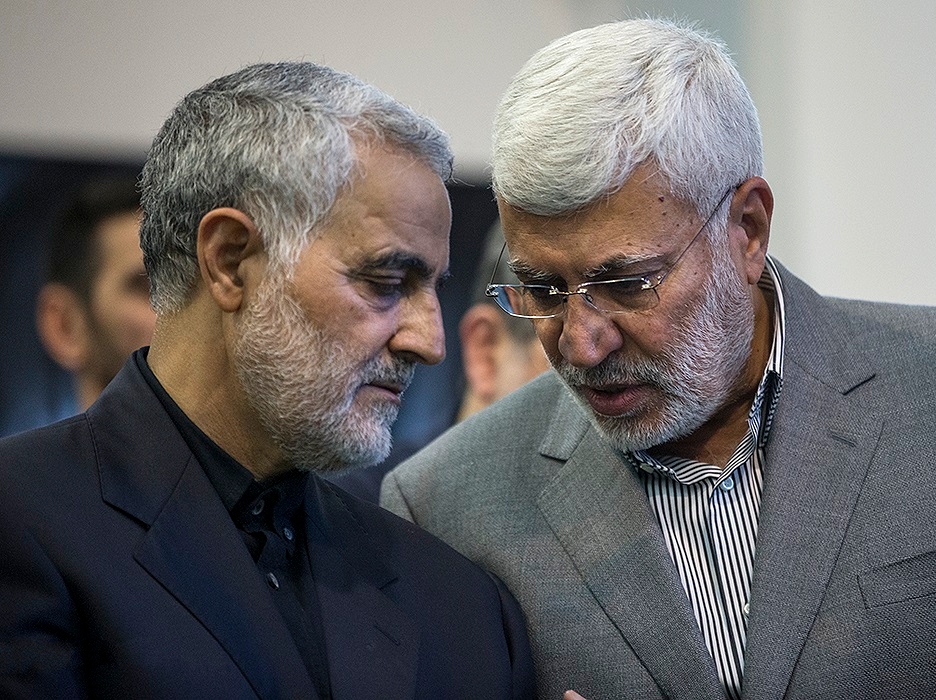Whether in Iraq, Syria or Lebanon, Iran and its allies are acquiescing to the ascendancy of their enemies, writes As`ad AbuKhalil.

Protesters in Tehran’s Green Movement, June 16, 2009. (Milad Avazbeigi , CC BY-SA 2.0, Wikimedia Commons)
By As`ad AbuKhalil
Special to Consortium News
 Ever since President Hassan Rouhani took over in 2013, the government in Iran has been in a state of strategic caution or even retreat. Following the so-called Green Movement (of largely urban youth following the disputed — and most likely fraudulent — 2009 presidential election), the team of Rouhani and Foreign Minister Javad Zarif appealed to young educated Iranians by promising reconciliation with the West and quick economic relief.
Ever since President Hassan Rouhani took over in 2013, the government in Iran has been in a state of strategic caution or even retreat. Following the so-called Green Movement (of largely urban youth following the disputed — and most likely fraudulent — 2009 presidential election), the team of Rouhani and Foreign Minister Javad Zarif appealed to young educated Iranians by promising reconciliation with the West and quick economic relief.
Their bet was based on the notion that making concessions to the U.S. on the nuclear program would inevitably bring a swift end to the lethal sanctions imposed by the U.S., and consequently by most of the world. (Any country that violates U.S. sanctions can expect to be hit by them itself, a risk few countries will run. Even Lebanon — which is falsely presumed to be run by Hizbullah — strictly adheres to U.S. sanctions against Iran). But the Rouhani-Zarif team erred on many fronts.
Firstly, they negotiated with a U.S. president in the last two years of his presidency — the “lame duck” phase as Americans term it — when his ability to achieve goals or even sway U.S. Congress was weakened. Barack Obama could not even convince the U.S. Senate to consider his nominee for the Supreme Court. Yet, the Rouhani-Zarif team calculated that Obama would be able to guarantee perpetual American endorsement of the deal, although it was reached mere months before the post-Obama presidential campaign got underway.
Secondly, the Iranian regime did not even try to reach a treaty agreement with the U.S., which would have required Senate ratification (and that would have been impossible given the Republican majority there). So, the Iranians should have known that they basically reached a tenuous agreement at best, with a shelf-life no longer than Obama’s dwindling term. That the agreement had the endorsement of the UN Security Council did not mean much to Washington, which flagrantly violates international law without paying a price.
>>Please Donate to CNs’ 25th Anniversary Spring Fund Drive<<
Thirdly, the agreement has iron-clad, built-in mechanisms for immediate international sanctions in the event Iran reneged on the agreement or violated its terms. The Iranian negotiating team did not insist, nor did they obtain, any means of redressing U.S. violations. So, the penalties for violations were placed squarely and one-sidedly on Iran. And even the UN Security Council resolution, which endorsed the agreement, contained no language to penalize member states for violating the agreement or the resolution itself, which — with Security Council endorsement — instantly became part of international law.

Zarif-Rouhani team. (Erfan Kouchari via Wikimedia Commons)
Rapid Breakdown
It only took the election of a Republican president to break the agreement. And it’s not even clear that a Democratic successor to Obama would not have proven responsive to the Israeli government’s unending list of demands and objections. As for the Europeans, as soon as Donald Trump began criticizing the agreement during the 2016 campaign, they joined in, saying the agreement had to be modified to end ballistic missile testing. That was never part of the agreement (it was proposed by the U.S. side but the Iranians adamantly refused to include it in the negotiations).
And once the agreement was violated by the U.S — or once the U.S. decided to discard its approval of the UN Security Council resolution endorsing the agreement — Iran never gave up trying to revive a corpse. Trump made it very clear that the agreement was dead, and he proposed new sets of negotiations but the Rouhani-Zarif team continued to bank on the Europeans to salvage the deal. But rarely, since WWII, have European governments disagreed with the U.S. on its foreign policy principles in the Middle East. French General Charles De Gaulle’s reaction against Israeli attacks on Egypt, Syria, and Jordan in 1967 stands as a notable exception.
Rouhani-Zarif, who pride themselves on being Western experts, proved to be naïve in thinking that they could — based on Iranian goodwill and faithful adherence to the nuclear deal — steer Europe away from U.S. and Israeli foreign policy priorities. That has been proven to be foolish. Iran is today in a standstill, or quicksand: not obtaining an alternative from Europe to enable it to trade in the international market, and not willing to discard the nuclear agreement altogether.
The Europeans have failed miserably to provide an alternative system to allow Iran to purchase from the international market. Europeans are either unwilling or unable to sidestep U.S. financial sanctions, and European companies are not willing to risk U.S. displeasure. But how could the Iranians not insist on the insertion of clauses to ensure that their compliance with the agreement would be rewarded, even in the event of U.S. violations?
Meanwhile, the so-called Iranian hardliners are on the defensive in Iran. The Supreme Leader has basically stuck with the Rouhani-Zarif formula, probably for lack of political and military alternatives. U.S. sanctions, in the age of electronic banking, have become far tighter and more effective than they were during the 1990s when the U.S. imposed sanctions on Iraq; as cruel and inhumane as those sanctions were. Under Trump, U.S. sanctions were able to quickly shut down Iranian oil production, and signs of popular displeasure restrict the ability of the regime to engage in costly responses.

Iranian Foreign Minister Zarif and U.S. Secretary of State John Kerry say goodbye after Zarif read a declaration of the nuclear agreement in Farsi at the Austria Center in Vienna, July 14, 2015. (U.S. State Department)
Strategic Retrenchment
There are examples of Iranian strategic retreat, or retrenchment to be more accurate. Iran and its allies in the region are clearly sending the signals that they are firmly avoiding a fight with the U.S. and Israel at all cost. But in dealing with the U.S. and Israel, a demonstration of weakness will only invite more militancy and armed attacks.
Significantly, Iran and its allies calculated that a retaliation for the assassination of one of it top commanders, Qasim Suleimani, (and even that of Abu Mahdi al-Muhandis, a key leader of Hashd forces in Iraq whose role in fighting ISIS was probably bigger than that of U.S.-trained Iraqi generals) would be too costly. That lack of retaliation, however, is likely to invite more U.S. and Israeli attacks on Iranian targets. Suleimani was not only a key figure in the Iranian government but he was probably third in command (after Supreme Leader Ali Khamenei and Hizbullah’s Hassan Nasrallah) in the regional resistance alliance.

Qassem Soleimani (left) with Abu Mahdi al-Muhandis (right) at a 2017 ceremony in Tehran. (Fars News Agency, CC BY 4.0, Wikimedia Commons)
Israel and the U.S. can now calculate that they can easily get away with the assassination of figures lower (or even higher) in rank than Suleimani throughout the region. (Iran retaliated to Suleimani’s assassination by a symbolic attack on an abandoned U.S. military base in Al-Anbar). What would restrain the U.S. role—but not Israel’s—in escalation is the inclination of Trump — especially in the age of Coronavirus and economic recession — to avoid military adventures overseas.
Whether in Iraq, Syria, or Lebanon, Iran and its allies are demonstrating extreme caution and even acquiescence to the ascendancy of their enemies. The Iranian government has extended its congratulations to the appointment of a new Iraqi prime minister with a record of serving as a puppet of American occupation. (Mustafa Kazimi worked with the Iraq Memory Foundation, which was run by the neo-conservative Kanan Makiya. And he even signed a petition expressing gratitude to former U.S. President George W. Bush and former U.K. Prime Minister Tony Blair for invading and occupying Iraq). Iran is no longer insisting that one of its allies, or a man less close to the American occupation, be appointed a prime minister.
In Syria, Israel continues its successive attacks on Iranian and Hizbullah military targets with no responses or retaliation from either party. In Lebanon, the new government is proceeding with negotiation with the IMF despite earlier reservations by Hizbullah. On top of that, Hizbullah decided to stay quiet about a brazen U.S. smuggling of a wanted Lebanese-American man (Amer Al-Fakhouri) who had served as a warden for the notorious Israeli torture prison in Khiyam.
And despite growing popular anger at Lebanon’s central bank governor, Riad Salame, who is widely blamed for the country’s financial ruin, neither Hizbullah nor its allies are pushing for his ouster because it is widely acknowledged that Salame is under U.S. government protection. The only exception are the Houthis in Yemen, who refuse to budge in their effective and fierce self-defense against the cruel Saudi assault.
Iranian lack of deterrence is not necessarily a contribution to regional peace. That is especially true now that a new Israeli government (and a disgraced sitting prime minister) may be looking for an opportunity to attack Iran, given the unconditional American support for Israel under Trump.
Iranian reluctance to retaliate against continued Israeli attacks in Syria, will only lead Israel to conclude that there are no penalties to pay for Israeli regional aggression. Only in Lebanon is Israel deterred, due to Hizbullah’s established record of treating any Israeli attack as a cause for a retaliatory attack on Israel.
But even here, a recent Israeli drone attack on the southern suburbs of Beirut was met with no response from Hizbullah either. Israel may be looking for a fight and its enemies may not be willing to give it what it may want: all-out regional war.
As’ad AbuKhalil is a Lebanese-American professor of political science at California State University, Stanislaus. He is the author of the “Historical Dictionary of Lebanon” (1998), “Bin Laden, Islam and America’s New War on Terrorism (2002), and “The Battle for Saudi Arabia” (2004). He tweets as @asadabukhalil
The views expressed are solely those of the author and may or may not reflect those of Consortium News.
>>If you value this original article, please donate to CNs’ 25th Anniversary Spring Fund Drive<<

America needs to be treated for what it is, an utterly vile, implacable, predatory, hate filled regime with whom there can be no compromise, no negotiation, and no agreement.
Any concession or moderation is merely taken as a sign of weakness, encouraging further aggression and terrorism.
America has broken every agreement and treaty it has ever freely entered into, from the 300 plus treaties with the Red Indians onwards.
It gave a solemn undertaking not to expand Nato “one inch” beyond Germany. How did that work out?
The ABM Treaty, the INF Treaty, the JCPOA, are just a few obvious examples.
Agreements that were made with Russia over Syria were broken in less than 24 hours.
Any agreement with America isn’t worth the paper it’s printed on.
Like any bully, the Exceptional And Indispensable Folk are whining, cowardly scum who howl like babies when they pick on a victim who actually fights back.
The Chosen Folk who rule the roost in Washington no longer attack Lebanon, because they know if they do they will immediately pay a price.
The only thing both understand is a good hard kick in the balls every time they step out of line.
Any shitfuckery on the part of both needs to be met with an immediate, ferocious, disproportionate response.
All the countries in the neocon cross hairs have been far too reticent in their response.
They have been the victims of US terrorism, economic warfare, political subversion, propaganda vilification, and actual, genocidal aggression.
Russia should have broken off diplomatic relations the day after its diplomatic premises and the homes of its diplomats were invaded.
It should have countered sanctions by freezing all interest payments to western banks. On no account should it have supported US sanctions against Iraq, Iran, DPRK. It should have closed down the US supply route to Afghanistan and the joint space programme.
It should have boycotted exports of titanium, rare earth, rocket engines and nuclear fuel. Satellite countries in the EU and Japan should have been made to pay a very high price – no imports of western cars, tobacco, alcohol, clothing, jewellery, watches, perfume, electrical goods. All these things can be made domestically or imported from friendly countries. Making it clear there can be no discussions on any subject whatsoever, the Arctic, global warming, anything, as long as the aggression continues.
Set up a completely separate financial structure with China – and make it available to any country targeted by the US. Treat Iran, Syria, DPRK, Venezuela as the first line of defence. Give them all the weapons they need to defend themselves.
China can do the same and more. Make it clear that not one soya bean will be imported from America, not one dollar more will be spent on Treasury bonds. Impose a very high price from the outset and increase it every time the US and its satellites misbehave.
Kick Uncle Sam hard in the balls, and keep on kicking until he finally cleans up his act and learns some manners.
I just do not agree with the author’s analysis
“But the Rouhani-Zarif team erred on many fronts”
How could anyone on earth have predicted something like Donald Trump?
He took the entire world by surprise. A shocking, destructive surprise.
His ignorance, his rudeness, his belligerence have already become infamous.
Infamous too has been his willingness to sell American foreign policy in the Middle East to completely turn his back on the rule of law.
His destructiveness is exactly comparable to being hit by a bolt of lighting.
It has nothing to do with Iranian statesmen.
Rouhani and Zarif are men of exceptional talent and grace.
But there is no defense or preparation against being struck by lightening.
Has a country under US sanctions ever been allowed to exist in peace as a member of the international family of nations? I can’t think of one. We all know what happened to Iraq, and Libya was destroyed after sanctions were lifted despite Qaddafi complying with western demands.
So it seems to me that sanctions imposed by DC are a slow motion death sentence, that sooner or later affected countries can expect to be destroyed.
The only way to prevent this from happening is by standing up to US/NATO/IDF etc. aggressions. As the author states, any attempt to negotiate or bargain in good faith will be dismissed as a sign weakness.
Russia’s involvement in Syria stopped the planned wholesale destruction of that country. But Russia basically sitting on its hands there as Israel and the US do what they want means Syria is being slowly strangled to death instead.
The US strategy seems to be one of relentlessly provoking its rivals military and economically, counting on them being too afraid or too weak to retaliate, and slowly chipping away until an opportunity to destroy them outright presents itself.
This is a rather bleak scenario as it means only a direct confrontation with the US and its henchmen will loosen their grip. The US has indicated that it is willing to use nuclear weapons in response to a conventional attack on its forces, making countries like Russia think twice before calling the American bluff.
But American and western power is not invincible. Western societies are in disarray both socially and economically and the west’s military and economic clout is not as all powerful as its leaders like to imagine.
The only strategy China, Russia, Iran, and other countries the US seeks to dominate, can pursue if direct confrontation is ruled out is a slow and indirect chipping away at American economic power. If the dollar is abandoned as the world’s primary reserve currency this would seriously impact US ability to endlessly print the money it needs to finance its massive military infrastructure around the world, and make waging war very expensive indeed.
So far, however, it seems China and Russia are acting very very cautiously. Have they finally realized that the US is not an honest broker, does not negotiate in good faith and that agreements made with its government aren’t worth the paper they are printed on? Or are they still waiting for a “sane” president who will not behave like he or she is the leader of the fourth reich?
The slow motion collapse of the west socially and economically is being highlighted by the Covid-19 outbreak for all the world to see and eventually something will have to give.
I wonder, as the decline continues, will the supremacist one-world-empire mindset be abandoned, or will its leaders instead abandon reason and adopt an apocalyptic “our way or no way” mentality? I also wonder how China, Russia, Iran et al. see things and what long term strategies they have up their sleeves? I do hope that they are not counting on the US and its vassals smarting up anytime soon.
America can collapse at any time like a house of cards. It is far weaker than anybody realises, like the Soviet Union in the 1980s. It is likely to implode financially, economically, politically, socially, racially, and spiritually, very soon. This seems inevitable, and cannot come a moment too soon. When the Great Satan is finally cut down to size, and its jackboot is finally removed from the face of humanity, this can only usher in a better world for all humanity.
The Orange Baboon in the White House is currently borrowing nearly 50 cents of every dollar he spends, $3.2 trillion of a $6.7 trillion budget. Over the past 6 months, $11 trillion has been spent on propping up the Big Beautiful Stock Market and the CV. Tens of millions unemployed. Foreign policy failures and blunders wherever you look. This clown has bitten off more than he can chew, and he is going to choke on it.
“(Iran retaliated to Suleimani’s assassination by a symbolic attack on an abandoned U.S. military base in Al-Anbar)”
Yeah, it was so much symbolic that USA admitted 100+ injured, including medevaced from Iraq, from the ” abandoned” base.
“Green revolution” was a CIA job, as usual with such “revolutions”
I understand that the author is not happy with Iran and its allies, and has all rights to be. But facts are stubborn.
The parties I dont understand are Russia and China. Why are they esp Beijing not more supportive of Iran in supporting them economically politically and militarily? Their seeming neutraility is as dangerous strategically as Irans stalemate position.
“Their bet was based on the notion that making concessions to the U.S. on the nuclear program would inevitably bring a swift end to the lethal sanctions imposed by the U.S.”
Bwaaahaaaahaaaa!!!!
I’m not sure whether you are being sarcastic or not.
In truth I hope – for Iran and the regions’ sake (not including Occupied Palestine, except for the Palestinians themselves) that whatever the Iranian government – Rouhani and Zarif especially – and the IRGC remain strong and fully capable and willing to damage seriously if not destroy those who would destroy them. The latter definitely deserve all they get and hopefully sooner than later and in full measure.
Hi Anne,
Yes, I was being sarcastic. It was my clumsy attempt at pointing out the futility of making any deals with the U.S.-Zionist empire.